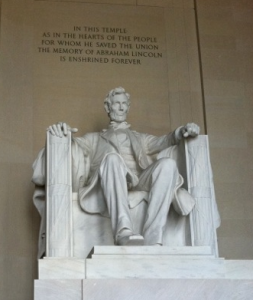 The president’s long lanky body swayed back and forth as the coach hit every pebble, stick and gopher hole on the road to Gettysburg. His massive hands held the quill and envelope tightly as he anxiously worked on the opening of the speech he was expected to give at the memorial ceremony in just over an hour.
The president’s long lanky body swayed back and forth as the coach hit every pebble, stick and gopher hole on the road to Gettysburg. His massive hands held the quill and envelope tightly as he anxiously worked on the opening of the speech he was expected to give at the memorial ceremony in just over an hour.
“80 or so years ago…”
Nope.
“About 90 years ago, give or take…”
Uh uh.
The coach lurched and the presidential head slammed into the roof. After recovering his senses, Lincoln put quill to paper with an inspiration, words that would echo through generations and outlast empires.
“A long time ago, in a galaxy far, far away…”
OK. It probably did not happen quite that way. In fact, it was nothing like that. At the summer public speaking workshop, we will study some great American speeches, including the Gettysburg Address.
Spoiler Alert! Lincoln did not write the speech hastily on the road to the memorial. That’s a legend that somehow fits our historical impressions of Lincoln as a folksy, wise, and humbly brilliant person. No doubt he was all of those things, but he also left few things to chance.
Lincoln apparently told a reporter several days before the speech that he had completed a draft but was still working on it (according to the late William Safire’s excellent doorstop of a tome, “Lend Me Your Ears”). Historians have documented revisions made between drafts.
The truth should not diminish Lincoln’s greatness. He knew he needed a plan. He knew the first draft needed revision. He knew that every word carried the burden of history.
It’s the same process of thoughtful discernment, planning and revising that we teach in our public speaking and essay workshops. Each student is a potential Lincoln.
“It is altogether fitting and proper that we should do this.”
-Abraham Lincoln, November 19, 1863
